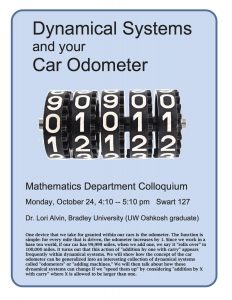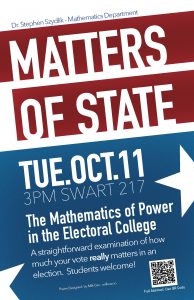Mathematics Colloquia
The Mathematics Colloquium Series features talks by department faculty or invited guest speakers on various topics in mathematics and mathematics education. These talks are open to the public.
The Basics of Neural Networks
Alex Lavrentiev
Associate Professor of Math for Fox Cities Campus
Wednesday, April 3, 2019, 4:10 – 5:10 p.m., Swart 217
Nov. 28, 2018, Colloquium: Number Talks
UW Oshkosh Math Professor Jen Szydlik and Associate Professor Amy Parrott
Wednesday, Nov. 28, 2018, 4:10 – 5:10 p.m., Swart 217
April 16 Colloquium: Math in German Schools and Museums

Math Professors Eric Kuennen and John Beam
Monday, April 16, 2018, 3 – 4 p.m., Swart 217
In Spring Interim 2017, we took a group of fourteen UW Oshkosh students to Germany for three weeks to study mathematics education from an international perspective. We visited German schools, observed math classes and talked with teachers, and paired with a class for pre-service mathematics teachers at Marburg University. We also visited many outstanding museums that feature some really neat mathematics.
In this presentation, we will present and discuss several of the demonstrations and exhibits that we experienced in these German museums, including an “Infinity Clock”, how to multiply using a parabola, and other interactive experiments at the Mathematikum in Giessen, some early calculating machines from the Arithmeum in Bonn, and solving a problem from an ancient Egyptian mathematics text at the Neues Museum in Berlin. We will also show photos and discuss our experiences in German schools and at Marburg University, and underscore the rich learning experiences available to students and their professors alike through study-abroad programs.
March 5 Colloquium: A Modular Mathematical Mystery
Dr. David Penniston, UW Oshkosh Mathematics Professor
Monday March 5, 2018,4:10-5:10 p.m., Swart 217
In the last twenty-five years modular forms have held a prominent place in number theory research. Most famously they played a central role in Andrew Wiles’ proof of Fermat’s Last Theorem, a problem that remained unsolved for over 300 years. In this talk we will explore how modular forms were used to answer a question that arose in my own research, a process that involved a good bit of detective work and offered some interesting twists and turns. The talk will be aimed at a general audience, and no knowledge of modular forms will be assumed – the only prerequisite is an interest in mathematics.
Nov. 10 Colloquium: Mathematical Models in Blood Clotting
Dr. Tyler Skorczewski, UW Stout Assistant Professor and UWO Math & Physics graduate
Friday Nov. 10, 2017, 3–4 p.m., Swart 217
Blood clotting, or hemostasis, is a vital process in the human body. Bleeding disorders, such as hemophilia, arise when hemostasis occurs on too slow of a timescale or not at all. On the other end of the spectrum, if clotting occurs too rapidly (thrombosis), pathological clots, or thrombi, can form, leading to heart attacks and strokes. Understanding how blood clotting occurs requires knowledge of biophysical and biochemical processes which take place over multiple scales in both time and space. Fluid flow is an integral component of the blood clotting system. Blood flow brings platelets and chemical reactants required for clot growth to a vascular injury site. In addition this flow imposes mechanical stresses that affect the formation and breaking of molecular bonds. In this talk we will discuss how the immersed boundary method can be used as a mathematical modeling framework to study both the fluid structure interactions of platelets moving in a blood vessel and how the platelets bind to the vessel wall in response to injury.
Oct. 24 Colloquium: Creating Research Projects In and Out of the Classroom
UW Milwaukee Mathematical Sciences Professor Gabriella Pinter
Tuesday, October 24, 2017, 4:10 – 5:10 p.m., Swart 217
Finding just the right research project for students can be challenging at all levels. However, working on one’s own project could provide powerful motivation, and can turn out to be a transformative experience, so we strive to have more and more students participate in some form of research.In this talk we are going to present a few different research projects that grew out of a mathematical modeling class, an undergraduate bio-math program and some Math Circles. We illustrate ways of finding/creating projects and show how simple-looking problems could go further and further and lead to surprising connections and results.
 October 24 Colloquium: Dynamical Systems and your Car Odometer
October 24 Colloquium: Dynamical Systems and your Car Odometer
Dr. Lori Alvin, Assistant Professor, Bradley University (and a graduate of UW Oshkosh)
Monday, Oct. 24, 4:10 – 5:10 pm, Swart 127
One device that we take for granted within our cars is the odometer. The function is simple: for every mile that is driven, the odometer increases by 1. Since we work in a base ten world, if our car has 99,999 miles, when we add one, we say it “rolls over” to 100,000 miles. It turns out that this action of “addition by one with carry” appears frequently within dynamical systems.
We will show how the concept of the car odometer can be generalized into an interesting collection of dynamical systems called “odometers” or “adding machines.” We will then talk about how these dynamical systems can change if we “speed them up” by considering “addition by X with carry” where X is allowed to be larger than one. This is joint work with Drew Ash (Davidson College) and Nic Ormes (University of Denver).

Matters of State: The Mathematics of Power in the Electoral College
Dr. Stephen Szydlik
Tuesday October 11, 2016, 3:00 – 4:00 pm Swart 217
“Power is a lot like real estate. It’s all about location, location, location.”
-Frank Underwood, House of Cards
Your vote counts. Of course it does. But does it count as much as a vote in California or Alaska? Issues of power and control in our government have been a part of the national conversation since our country’s inception, and the Electoral College has been a focus of much of that controversy. In this presentation, we will take a brief tour of the Electoral College and examine some of the mathematics behind its complexities. We’ll consider the question of whether any states have unfair advantages when it comes to power in the College, and we’ll work on answering one of the fundamental questions in any democracy: how much does my vote really matter?
MAILING ADDRESS
CONTACT US
(920) 424-1333
(920) 424-1812
Developmental Math Lab
Faculty and Staff
